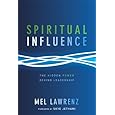 I've
been thinking a lot about influence lately. This has been stimulated in
part by Mel Lawrenz's (@MelLawrenz) recent book. As Mel was writing the
book, he wrestled with whether to use the word influence or leadership.
I've
been thinking a lot about influence lately. This has been stimulated in
part by Mel Lawrenz's (@MelLawrenz) recent book. As Mel was writing the
book, he wrestled with whether to use the word influence or leadership.- They both
involve the role of a person (leader/influencer) on others
- They both
highlight distinctive characteristics and point to an ideal (or
anti-ideal)
As I
have talked with many people recently, I have been struck by how many people
think they are not leaders and have only trivial influence. Really?
I suspect that most people have much more influence than they know.
The real difference may be between those with intentional influence, and those with casual influence.
Perhaps
one could illustrate it this way:
To illustrate how much influence you have, try this
experiment. Open up your cell phone or
your facebook, linkedin or Google+ account and look through this list. All of these entries represent people you
cared enough to enter into your list. Grab
a piece of paper and draw a line down the middle. Now as you walk through your friend list,
write names on the left side of the page of people who influence you, and names
on the right side of people you influence.
Look for patterns in your lists.
Here are some things to look for:
- Are there more names on the left or on the right? Why?
- Are the influencers typically older than you are?
- Is there a pattern related the principle setting of your relationships: Work, school, home, church, community?
- Is there a pattern of the content of your relationship: professional, hunting, sports, politics, online gaming?
- Where you are the influencer, are you a good influence or a bad one?
- When you receive influence from others, are you improved by the relationship?
- Which relationships take more of your time… influencing or being influenced?
Maybe you can derive some insight from
what is not on the list. Are you missing
mentors? Are you missing a key topic you
care about?
My point here is to be thoughtful
about the power of our influence and to make choices about direction and
content of our influence. The difference
between leaders and the rest of us may simply be intentionality. Or is it?
I can imagine some saying, “I am very
intentional about shaping my kids, but they don’t react to anything I
say.” (Or replace kids with any other group you hope to shape.) I’m leading, I’m intentional about my
influence, but my teammates are still the same schmucks they’ve always been.
You’ve heard it said that you’re a leader only if you have followers.
Is leadership simply a matter of intentional influence? It appears that there is a measure of effectiveness or power that matters, in addition to the object and intention of our influence. But it seems to me that intentional influence is an essential component of leadership.
Is leadership simply a matter of intentional influence? It appears that there is a measure of effectiveness or power that matters, in addition to the object and intention of our influence. But it seems to me that intentional influence is an essential component of leadership.
My thinking on this has just begun. Here are a few questions to stimulate a conversation. The
assumption is that people will want to be intentional about influence:
- How do I improve the impact of my influence when it is important to do so?
- How do I lead differently if there is an influence in my target’s life that is much greater than my own? Their neighbor? Family of origin? Disability? Boss?
By the way, if you’re interested in
more tools for mapping your social network, here are a few:
Map your linkedin connections
|
|
Facebook Friends on a Map
|
|
Facebook app: Super Friends.
|
